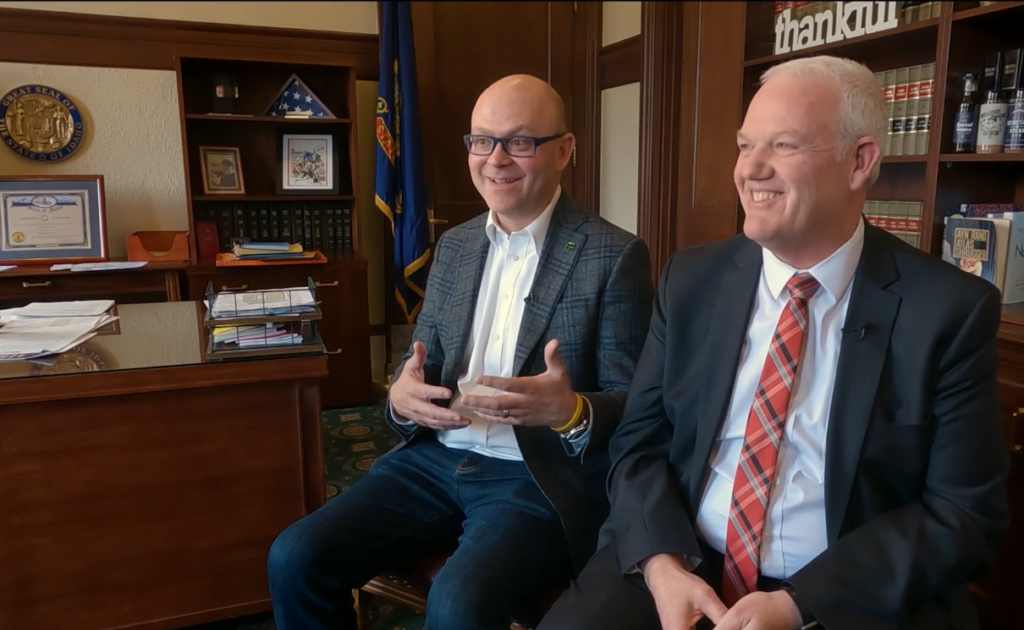From the Idaho Statesman
In a small basement room, under a low ceiling lined with white Christmas lights, four members of a library board huddled around a table. The board, like many others in the wake of a 2024 Idaho law governing library materials deemed “harmful to minors,” was grappling with a patron’s request to pull a book from library shelves.
The book in question: “The Bare Naked Book” by Kathy Stinson. Published in 1986 and updated in 2021, the book is a “joyous” anatomy book for children, according to Canadian publishers Annick Press. But in a written notice to the Ada Community Library in September, a patron took issue with its depictions of tattoos, nipple piercings and “transgenderism.”
Under Idaho law, public library boards have 60 days to move “harmful” books to adults-only access if challenged — or risk being sued.
In this case, the library was dealing with what Board Chair Steven Ricks called a “borderline book” — one he believed “could fall on one side or the other” of the law. In a statement at the Nov. 18 meeting, Ricks said he didn’t want the book taken out of the library altogether, but he agreed with a library staff recommendation that it should be moved from the children’s section to a “Parent-Teacher” shelf in the adult section.
Then, citing his 21 years of experience on the board, he laid out a protocol for how he planned to handle similar requests going forward.
“I have absolutely zero desire or intent to spend time to explore and expound upon the graphic, descriptive material in the book under discussion — any book under discussion,” he said. “… A decision will be announced by the chair. A vote will not be taken.”
The “Parent-Teacher” shelf houses non-fiction parenting books in the adult section of the Ada Community Library’s Victory Branch. Sarah A. Miller smiller@idahostatesman.comFor the second time in three months, a challenged book was relocated to the library’s adult section. In neither instance did the board hold a vote.
At the meeting, Ricks was adamant that a vote was not required by law. He emphasized that “unity of purpose and action” is a “valuable leadership model.”
But in interviews with the Idaho Statesman, a fellow trustee and professionals with expertise in both the harmful-materials legislation and Idaho’s open-meeting law raised concerns about the process.
Library board chair said no vote required; trustee found it ‘concerning’
After announcing the decision to relocate the book, Ricks asked his fellow trustees at the meeting if any objected. One did.
Mary-Anne Saunders, who was elected to the board in 2023, stated her objection with one word: “Yes.” It was noted in the minutes. But in Saunders’ opinion, that process was not sufficiently transparent.
“It’s no secret that I believe the board needs to vote on action items,” she told the Statesman by phone. “That is where I have a difference of opinion with the board chair.”
“I believe it’s important to tell the public what our opinions are … to record our positions, our vote,” she said.
Saunders said that Ricks’ stated protocol for handling requests felt to her like a “close-off” of discussion. Acting without a vote or full deliberation, she said, felt “concerning.”
In August, the board responded to another patron request by relocating the book “It’s Perfectly Normal” by Robie Harris without holding a vote, according to Saunders and meeting minutes available on the library’s website.
“Item was moved to adult collection,” the minutes read. “No formal action (was) taken.”
Saunders’ opposition was noted in those minutes as well.
Books line the “Parent-Teacher” shelf. This shelf was moved out of the library’s children section, according to minutes from an August board meeting. Sarah A. Miller smiller@idahostatesman.com
Ricks, a retired lawyer, leads a nonprofit that puts on the annual Hymns of Thanksgiving in Boise. He made unsuccessful runs for the Legislature, drawing accusations of violating the Church of Jesus Christ of Latter-day Saints’ neutrality policy in 2010 and a censure from the Ada County Republican Party after he sued it.
Ricks sat on the library board in 2023 when it voted to remove six books from the library’s collection — an action that was not on the agenda and was later rescinded for violating open-meeting law.
In an email to the Statesman, Ricks contended that it “it would be incorrect to assert or conclude that (The Bare Naked Book) was relocated without a vote.” He went onto say that no “formal vote” occurred, but that “there was, nevertheless, an accounting for the decision that was made.”
He noted that the library’s policy is for library staff to conduct an assessment of books challenged under the harmful-materials law, then submit a recommendation to the board. Trustees review the book and staff assessment, and the request is placed on a board meeting agenda as an “action item” within 60 days of the request, in compliance with the law. Then, he said, “a decision is made.”
He cited Idaho code stating that “Identifying an item as an action item on the agenda does not require a vote to be taken on that item.”
“Knowing that each trustee had reviewed the book and the staff’s recommendation,” he said, “… it was a simple question to ask if anyone had an objection to following the staff’s recommendation.The library district’s attorney, Stephanie Bonney of Boise’s MSBT Law, declined to speak with the Statesman, noting by email that she “(hasn’t) discussed this issue yet with the district.” She said she planned to reach out to the district to discuss meeting procedures.
In a section titled “Voting,” the district’s bylaws state: “An affirmative vote by the majority of board members present shall be necessary to approve any action of the Board.”
Ricks did not respond to follow-up questions from the Statesman.
Idaho transparency leader weighs in
Not everyone agrees with Ricks’ interpretation. According to Betsy Russell, the president of Idahoans for Openness in Government, a nonprofit working with the Idaho Secretary of State’s Office and others to put on a series of training sessions on government transparency, the board chair is “misreading” the law.
Russell, a retired news reporter, said she believes the code Ricks cited is intended to allow governing bodies to refrain from acting on an action item, for example, to table a decision to a later date.
“For the board to take action, they need to vote, and that vote needs to occur in public at an open meeting where the public can observe how its representatives conduct their business,” Russell said. That’s especially true because the board did not have unanimous consent, she said.
“The open-meeting law does not have an exemption for uncomfortable or unpleasant discussions, deliberations or decisions,” she said. “As uncomfortable as the business of governance can be, it still must be done in public.”
The Statesman contacted the Idaho Attorney General’s Office by email but did not receive a response. The Ada County Prosecutor’s Office, whose civil divisionoversees matters related to public records and open meetings, responded to an email inquiry by directing the Statesman to the Attorney General’s Idaho Open Meeting Law Manual.
Libraries work to comply with law critics call ‘unclear’
According to a recent survey from the Idaho Commission for Libraries, an agency created by the Legislature, nearly all public libraries in the state comply with the 2024 harmful-materials law, State Librarian Stephanie Bailey-White told the Statesman. That includes the Ada Community Library.
Just one library, the Donnelly Public Library, has not yet completed the survey, Bailey-White said by phone.
Bailey-White said many libraries have updated their collection development policies since the law was passed, and how libraries comply can vary based on their own policies. In terms of responding to a request for reconsideration or relocation of a book, Bailey-White said she didn’t believe that was a “staff decision” but a board decision.
“If it says a board of trustees, then it’s a board of trustees,” she said, “and those are decisions the board should make together.”
But according to Rep. Ilana Rubel, D-Boise, a lawyer, the law is “unclear” and gives a variety of actors broader discretion to have books relocated.
“It’s set up so that (there’s) one accusation and guilt is presumed,” said Rubel, “or at least, it was never clear what the mechanism would be to actually have a reasonable way to salvage a book … if it was, in fact, wrongly charged,” said Rubel by phone.
“Anybody who wants to complain can just get the book removed,” she said.
This story was originally published November 24, 2025 at 4:00 AM.
From the Idaho Statesman

